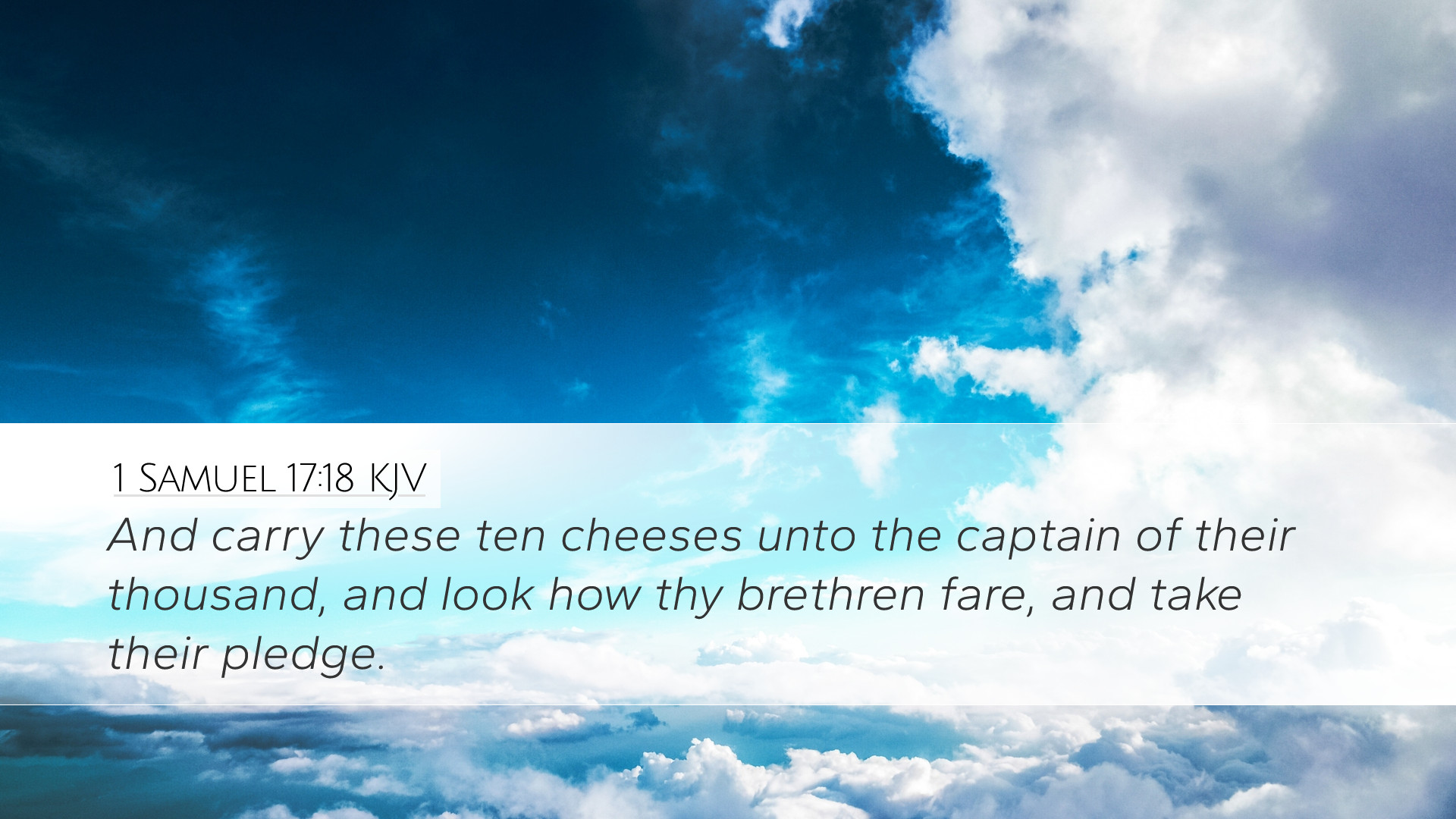Commentary on 1 Samuel 17:18
Bible Verse: 1 Samuel 17:18 – “And carry these ten cheeses unto the captain of their thousand, and look how thy brethren fare, and take their pledge.”
Introduction
This verse appears within the larger narrative of David's anointing and his involvement in the conflict with the Philistines, specifically Goliath. The verse shows the interaction between David and his father Jesse, illustrating both familial responsibility and the unfolding drama in Israel's history. Through the insights of public domain commentators such as Matthew Henry, Albert Barnes, and Adam Clarke, we can explore the theological and practical implications of this verse.
Contextual Analysis
The backdrop of 1 Samuel 17 is critical for understanding this verse. Israel is at war with Philistia, and Goliath, a giant warrior, is challenging the Israelite army. David, a young shepherd, is brought into this narrative by his father's command to deliver provisions to his brothers who are serving in the army.
Responsibility of David
Matthew Henry highlights that this mission shows David's diligence and obedience to his father. It emphasizes the importance of fulfilling familial duties, even in the face of greater national concerns. As he states, “David’s office was to tend his father’s flock, but he is sent on an errand to his brethren, which indicates the virtue of a dutiful child.”
Provisions for the Soldiers
Albert Barnes points out the significance of the "ten cheeses." This detail signifies a practical concern for the soldiers’ morale and sustenance. It reflects the common practice of sending provisions to troops, underscoring both the human and community aspects of warfare in ancient Israel. As Barnes notes, “Provisions, especially cheese, were a staple in the diet; Jesse was concerned for the well-being of his sons.”
Theological Insights
Divine Providence
In this moment of daily life, the hand of God is subtly at work in the affairs of men. Adam Clarke suggests that even in mundane tasks, God prepares individuals for greater purposes. David's simple task of delivering food is the first step toward his destiny of facing Goliath and ultimately becoming king. Clarke affirms, “God prepares his chosen ones through everyday responsibilities and seemingly insignificant tasks.”
The Nature of Faithfulness
Henry emphasizes the virtue of faithfulness in small matters. He writes, “He that is faithful in little shall be made ruler over much.” David's attention to his father's instructions is a testament to his character and faithfulness, a quality that will serve him well in future challenges. This serves as an encouragement to believers to be diligent in everyday assignments, as these may lead to divine opportunities.
Lessons for Today
- Faithfulness in the Routine: The church today can learn from David's example of faithfulness in his responsibilities. Whether in ministry or secular work, being diligent in what seems ordinary can lead to extraordinary divine uses.
- God in Our Daily Lives: This passage encourages believers to recognize God's presence and providence in their daily routines. We often underestimate the significance of our daily duties.
- Preparation for Leadership: David’s preparedness for leadership began with a simple act of service. Leaders often must start small and be faithful in minor tasks before they are entrusted with greater responsibilities.
Conclusion
1 Samuel 17:18 serves as a potent reminder of how God's divine plan unfolds through the mundane tasks of life. In analyzing this verse with the insights of biblical commentators, we can appreciate the intricacies of faithfulness, responsibility, and the sovereign hand of God guiding His chosen ones. As we reflect on David's early journey, we are inspired to remain diligent in our own daily lives, trusting that God can use our faithfulness to accomplish His purposes in His timing.


